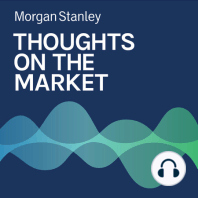4 min listen
Daniel Blake: The End of an Era for Japan
ratings:
Length:
4 minutes
Released:
Feb 16, 2023
Format:
Podcast episode
Description
Next month the leadership of the Bank of Japan will change hands, so what policy shifts might be in store and what does this imply for markets?----- Transcript -----Welcome to Thoughts on the Market. I'm Daniel Blake from Morgan Stanley's Asia and Emerging Markets Equity Strategy team. Along with my colleagues, bringing you a variety of perspectives, today I'll discuss Japanese equity markets and the changing of the guard at the Bank of Japan. It's Thursday, February 16th at 8 a.m. in Singapore. March the 10th will mark the end of an era for Japan, with Haruhiko Kuroda completing his final meeting at the helm of the Bank of Japan. Alongside the late Shinzo Abe, Kuroda-san has been instrumental in creating and implementing the famous Abenomics program over the last decade, and we think he's been successful in bringing Japan out of its long running deflationary stance. And just this week we've had the nomination of his replacement, Kazuo Ueda, a well-respected University of Tokyo professor and former Bank of Japan board member. He may not be a household name outside of the economics community, but his central bank and policy bloodlines run deep, having studied a Ph.D. at MIT alongside former Fed Chairman Ben Bernanke and under the tutelage of Stanley Fischer, former Bank of Israel governor and vice Fed chair. So as we see a generational handover at the BoJ, what do we expect next and what does it imply for equity markets? Firstly, Japan has made a lot of progress, but we don't think the mission has been fully accomplished on the Bank of Japan's 2% inflation target. Current inflation is being driven by cost pressures and while wage growth is picking up, we don't think wages will move up to the levels needed to see inflation at 2% being sustained. So we don't expect the BoJ under Ueda-san to embark on a tightening cycle the way we have seen for the Fed and the ECB. However, we can look for some change and in particular we think Ueda-san will look to resolve some of the market dysfunction associated with the policy of yield curve control. This is where the BoJ looks to cap bond yields at the ten year maturity, around a target of 0%. We expect he'll exit this policy of yield curve control by summer 2023, allowing the curve to steepen. And thirdly, we'll be watching closely his perspective on negative interest rate policy as we weigh up the costs and benefits and the transmission of negative rates into the real economy, albeit at the cost of profitability impacts for the banking sector. His testimony before the DIT on February 24th and his approach to negative interest rates under his governorship will be important to watch. We expect negative interest rate policy to be dropped, but not until 2024 in our base case, but this remains a key debate. So in terms of implications, this is more evolution than revolution for macro policy in Japan. And importantly, we see fiscal policy remaining supportive as the program of new capitalism and Ueda-san looks to strengthen social safety nets and double defense spending from 1% of GDP. Secondly, for equity markets, we see a resilient but still range bound outlook for the benchmark TOPIX Index. Our base case target of 2020 for December 2023 implies it doesn't quite break the top of its three year trading range, but remains well supported. Finally, at a sector level, banks and insurers may benefit from a tilting policy away from yield curve control. Again, especially if followed by a move back to zero rates from negative rate policy. In summary, we'll be watching for any shifts in the BoJ reaction function under the new leadership of Kazuo Ueda, but we do not expect a macro shock to asset markets. Instead, some micro adjustment in the yield curve control policy, and potentially negative interest rates, could help the sustainability of very low interest rates in Japan. Thanks for listening and if you enjoyed the show, please leave us a review on Apple Podcasts and share Thoughts on the Market with a
Released:
Feb 16, 2023
Format:
Podcast episode
Titles in the series (100)
Mike Wilson: Weighing a Potential Fed Rate Cut by Thoughts on the Market
